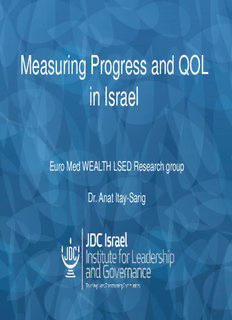
Measuring Progress and QOL in Israel PDF
Preview Measuring Progress and QOL in Israel
Measuring Progress and QOL in Israel Euro Med WEALTH LSED Research group Dr. Anat Itay-Sarig Israel's Progress Index Israeli Society for Sustainable Economics, 2007 OECD correspondent in Israel of "Measuring and Fostering the Progress of Societies". Partners: › The Israeli Central Bureau of Statistics › Academic experts › The Ministry of Environmental Protection › Environmental NGO’s › Social NGO’s › Israeli Public The Process • Research on the data available in Israel; • Calculating the GPI / ISEW; • Assembling a report card based on best practices and experts' recommendations; • A public, Internet based survey on preferred indicators of progress; The Result: core indicators indicating that the current methods and indicators are insufficient, as well as resurfacing the questions of “who decides” and “what to measure”. • A bottom up process of workshops across Israel, to discover what indicators the Israeli society wishes to measure. • As well as – bringing the government on board. Community Indicators in Israel • 400 people • 20 Workshops, 2.5 hours long. • About 20 people in each workshop • 46% woman; 54% man • 4 languages ( Hebrew, Arabic, Russian, English) • Across religious affiliations: Jews (Orthodox, Reform, Conservative, Secular) Muslim, Christian. • Various professions Community Indicators • An open process (intro, exploring, gathering and deciding). • 7 worksheets: Economy, Family & Community, Education, Health, Security, Work, Environment. • Consensus indicators and additional indicators. Family & Community • 83% Family indicators: – Free time with kids, friends, partners / number of family meals • 60% community indicators: – Accessibility to culture centers, employment areas, education – Number of community centers – Loneliness index • 60% individual indicators: – Time spent in watching TV – Extra curriculum activity – Number of hours volunteering – Number of familiar faces in the neighborhood. – Sense of belonging to the community • Additional indicators: voting, multiculturalism of public officials etc. Developments • The discourse has become familiar; • Israel has joined the OECD; • “Supporting” developments: the measuring trend, the economic crisis; Recent Developments: • Ministries • JDC The Ministry of Environmental Protection – TOP DOWN Growth, Sustainability and Well-Being Indicators Israel 2000-2010 Jerusalem, November 2012 Ministry of Environmental Protection, Planning and Policy "It is the responsibility of Israel’s leadership to understand the economic challenges which confront the state and to manage the country’s resources accordingly, based on a long term outlook and a review of a wide range of outcome indicators that go beyond GDP." • A new and wider economic model, which internalizes environmental and social aspects as well. • The Ministry of Environmental Protection, in cooperation with the Bank of Israel, the Central Bureau of Statistics and other ministries • Formulated a preliminary series of complementary indicators which alongside the GDP will provide a comprehensive and more reliable picture for measuring well-being in Israel. • Hoping to see them presented with the state budget alongside the GDP and growth data. These data will provide decision makers with a fuller and more reliable picture which will assure optimal decisions on state budget priorities. • Hoping to measure additional indicators – lacking data. The Ministry of Environmental Protection – TOP DOWN • A report card - domains: • Environmental Indicators – Financial Investment – Utilization of Natural Resources – Environmental Health – Positions and Perceptions on Environmental Issues (Subjective Indicators) • Social Indicators – Health – Education – Society, Civic Engagement and Personal Security – Social Positions and Perceptions (Subjective Indicators) • Economic Indicators – Economic Situation and Equality – Employment – Housing – Economic Position and Perception (Subjective Indicators) • OECD pilot;
Description: